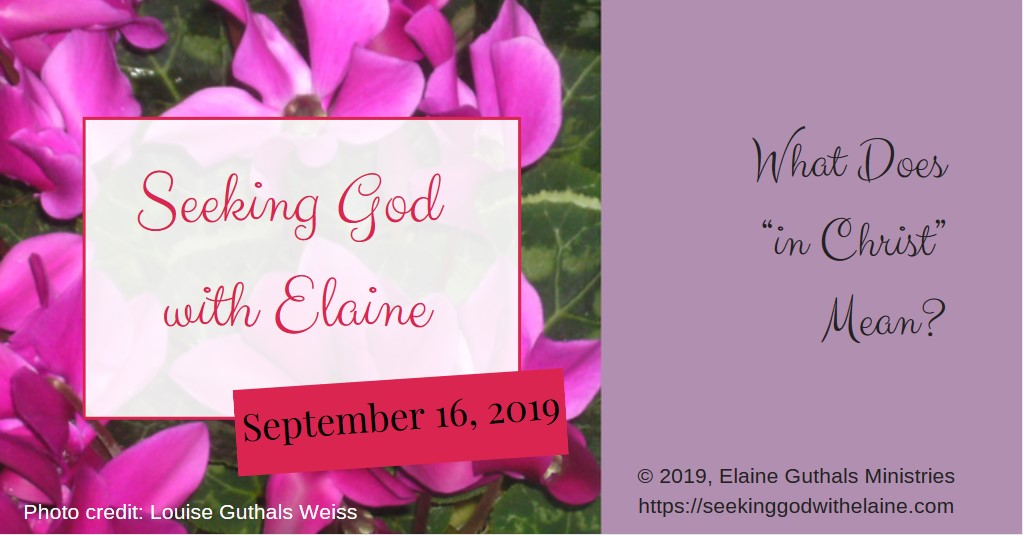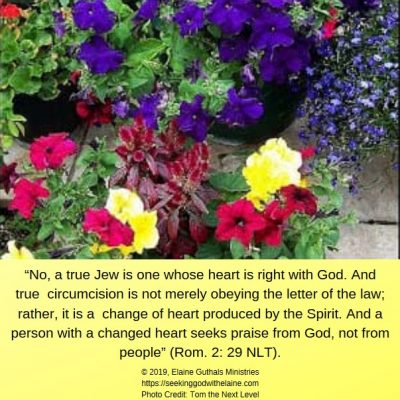Therefore remember that at one time you Gentiles in the flesh, called the uncircumcision by what is called the circumcision, which is made in the flesh by hands — remember that you were at that time separated from Christ, alienated from the commonwealth of Israel, and strangers to the covenants of promise, having no hope and without God in the world. But now in Christ Jesus you who once were far off have been brought near in the blood of Christ.
Ephesians 2: 11-13 (RSV)
Remembering may or may not be a pleasant experience. Paul wanted us to remember what it was like “without Christ” in order to contract it with our lives “in Christ.” This devotion looks at what exactly being “in Christ” means.
Nuggets
- Everybody was in the same unredeemed boat as, in the spiritual sense, we are all uncircumcised Gentiles.
- Paul specifically wanted his readers to remember the time before salvation to contrast “without Christ” to “in Christ.”
- When we are “in Christ,” sin no longer has a hold on us.
- The restoration of our relationship with God has been made because of the power “… in the blood of Christ” (Eph. 2: 13 RSV).

Remembering our past can sometimes be something enjoyable. However, it can also be something we would rather not do.
Paul wanted us to remember our lives before we had invited Jesus to be our Lord and Savior and God to be our Sovereign God — “without Christ.” He wanted us to remember so that we could be encouraged when looking at our lives “in Christ.” What, really, does “in Christ” mean?
Remembering Our Sinful Condition
“Therefore remember that at one time you Gentiles in the flesh, called the uncircumcision by what is called the circumcision, which is made in the flesh by hands” (Eph. 2: 11 RSV).
I thought the words that Paul used was interesting: “… you Gentiles in the flesh …” (Eph. 2: 11 RSV). I wondered if Paul was trying to say everyone — even Jews — were in a lost condition.
You know. “Obviously, the law applies to those to whom it was given, for its purpose is to keep people from having excuses, and to show that the entire world is guilty before God” (Rom. 3: 19 NLT). Everybody was in the same unredeemed boat.
I think Paul was speaking more than literally here. Yes, “being Gentile” was a derogatory remark used by the Jews. The Israelites (the circumcised) looked down on the Gentiles (the uncircumcised). Big time.
But Paul was saying, in the spiritual sense, we are all uncircumcised Gentiles. We are all “without Christ” until we ask Him to be our Lord and Savior.
Paul was talking about an inward circumcision. “No, a true Jew is one whose heart is right with God. And true circumcision is not merely obeying the letter of the law; rather, it is a change of heart produced by the Spirit. And a person with a changed heart seeks praise from God, not from people” (Rom. 2: 29 NLT).
But that isn’t the focus of the verse. The focus of this verse — and verse 12 — is to remember. Remember what used to be without Christ.

"Without Christ"
“remember that you were at that time separated from Christ, alienated from the commonwealth of Israel, and strangers to the covenants of promise, having no hope and without God in the world” (Eph. 2: 12 RSV).
Paul specifically wanted his readers to remember the time that they were without Christ. He wanted them — and us — to contrast “without Christ” to “in Christ.” Paul said eight — maybe nine depending on how you read one of the “in Him” references — times that we are “in Christ.”
That is stressing the contrast. Before Christ, we were lost; after Christ, we are saved. Before Christ, we were dead; after Christ, we are alive. Before Christ, we were miserable; after Christ, we are joyful.
Some may consider the “alienated … strangers … having no hope …” (Eph. 2: 12 RSV) the worst parts. Paul saw the worst was “… without God …” (Eph. 2: 12 RSV).
Paul’s point was we have nothing without God. We are not blessed without God.
Yes, we know that God does bless even non-believers (Mt. 5: 45). Believers receive blessings abundantly. “But seek first his kingdom and his righteousness, and all these things will be given to you as well” (Mt. 6: 33 NIV). “All these things” are food, drink, and clothing. He will provide to His children.
But it isn’t all about the material things. It is about eternal life.
The kicker is we have no hope of it getting better if we don’t have God. This is about the alienation.
There was a time when man was not alienated from God. “And they heard the sound of the Lord God walking in the garden in the cool of the day, and the man and his wife hid themselves from the presence of the Lord God among the trees of the garden” (Gen 3: 8 RSV).
Yes, this was the only time we see the interaction between God and man in the Garden — and this doesn’t end well. But Adam and Eve are not hiding because God is in the Garden. They are hiding because they are naked.
Their not being scared of Him leads us to believe that God had visited them before. That would mean He has seen them naked before. That is the polar opposite of alienation. That is relationship.
That is what God wants back. He wants the connection. The sense of family.
The way we get that back is to be “in Christ.” God used Family to get the family back.

But Now "in Christ"
“But now in Christ Jesus you who once were far off have been brought near in the blood of Christ” (Eph. 2: 13 RSV).
But now.
Now that God has sent His Son to be our Redeemer and Savior. Now that the plan to restore our relationship with Him has been accomplished.
Now that we have ABCDed. Now that we have asked Jesus to be our Redeemer and Savior.
The ABCDs of Salvation
A – admit our sins
B – believe His Son Jesus is our Redeemer
C – confess God as Sovereign Lord
D – demonstrate that commitment by making any changes needed in our lives to
live the way in which God has called us
If you have not become a believer in Christ, please read through the Plan of Salvation and prayerfully consider what God is asking you to do.
Now we are “in Christ.” Sin no longer has a hold on us.
Our relationship has been restored. We can call on God as our Father. We can walk with Him in the Garden — and on the street and in our houses.
That restoration has been made because of the power “… in the blood of Christ” (Eph. 2: 13 RSV). His blood sealed the everlasting covenant. “Now may the God of peace, who brought up from the dead our Lord Jesus — the great Shepherd of the sheep — with the blood of the everlasting covenant” (Heb. 13: 20 HCSB). The everlasting covenant is “… between me and you and your descendants after you for the generations to come, to be your God and the God of your descendants after you” (Gen. 17: 7 NIV).
By putting our faith in Jesus, we are members of that covenant. By believing in the power of His blood, our sins are completely punished and pardoned.
Making the Connections
Looking at the bad reminds us of how good the good is. When we contrast “without Christ” to “with Christ,” there is no comparison.
We also need to look back at the mistakes we have made in the past. God uses those experiences to bring us to Him.
Remembering those experiences to help us grow in the present. This happens when we put the past experience in the right context.
I am thinking of the I Am They song Scars. I love how it says, without the scars, we wouldn’t know who Jesus is.
Without our scars, we don’t know who we — and He — are.
We shouldn’t just be humiliated and biting on ourselves. If we are stymied by that experience, it can’t be used to help us grow.
However, if we truthfully look at the experience, evaluate it, and use it to set goals for improvement, we can grow from it.
If we don’t remember, we can’t see how God uses this experience to expand His kingdom and help us grow. We will not be able to use our experiences to help others grow.
God does want us to remember. “Remember that you were slaves in Egypt, and that I, the LORD your God, rescued you by my great power and strength. That is why I command you to observe the Sabbath” (Deut. 5: 15 GNT). He wants us to remember His love, power, and deliverance. He wants us to remember He saved us, not we ourselves.
God wants us to remember so we can be grateful. It should make us want to change.
How Do We Apply This?
Satan is going to try to stymie us. He is going to use our past failures to get us to think we are unworthy of God’s love. That will make us think we can’t accept God’s gift of salvation.
When we continue to mess up even as disciples, Satan will try to get us to think that God has given up on us. He hasn’t. He loves us and is preparing us — even through the mess ups — for life with Him.
We’ve got to forget about this is how we messed up. We have to remember this is how God rescued us.
Loving Heavenly Father. Thank You for not giving up on us. Thank You for loving us enough to want our relationships with You restored. Thank You for providing a way for that to be accomplished. Help us to remember all of the good things You have done for us. Help us to remember our mistakes so that we can grow closer to You. Amen.
What do you think?
Leave me a comment below (about this or anything else) or head over to my Facebook group for some interactive discussion.
If you don’t understand something and would like further clarification, please contact me.
If you have not signed up for the email daily or weekly providing the link to the devotions and the newsletter, do so below.
If God has used this devotion to speak with you, consider sharing it on social media.
Pingback: How Does Peace Help Us Tear Down Walls? – Seeking God with Elaine
Pingback: How Do We Gain Access to God? – Seeking God with Elaine
Pingback: How Does God Build a Community? – Seeking God with Elaine
Pingback: How Do We Speak? – Seeking God with Elaine
Pingback: Should We Rewrite History? – Seeking God with Elaine
Pingback: What Is the Mystery of Christ? – Seeking God with Elaine
Pingback: What Is the Relationship Between Righteousness and Wisdom? – Seeking God with Elaine
Pingback: Paul’s Take on Children of God – Seeking God with Elaine
Pingback: The Unbelieving State of the Gentile Church – Seeking God with Elaine
Pingback: How Are We Made New Creations? – Seeking God with Elaine